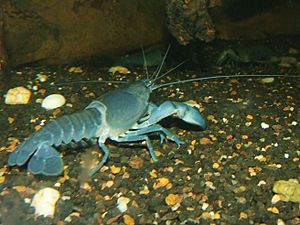Yabby facts for kids
A yabby or yabbie is a special name used in Australia for two different types of crustaceans. Crustaceans are like insects, but they live in water and have hard shells. These two types of yabbies are quite different, with one living in fresh water and the other in the ocean.
Contents
What is a Yabby?
In Australia, the name "yabby" can mean two things. It can be a type of crayfish that lives in fresh water, or it can be a kind of ghost shrimp that lives in the ocean. Both are interesting creatures found in different parts of Australia.
Freshwater Yabbies: The Crayfish Kind
The most common yabby people think of is the freshwater yabby. This yabby is a type of crayfish from a group called Cherax. They are often caught for food because they are tasty!
Where Freshwater Yabbies Live
Freshwater yabbies live in many places across Australia's eastern states. You can find them in:
- Dams
- Ponds
- Lakes
- Rivers
They like to hide in muddy or sandy bottoms.
What Freshwater Yabbies Look Like
Freshwater yabbies have a hard outer shell, like a suit of armor. They have strong claws, which they use for finding food and defending themselves. Their color can change, but they are often greenish-brown or blue.
Marine Yabbies: The Ghost Shrimp
The other type of yabby is a marine yabby, also known as a ghost shrimp. These yabbies are very different from their freshwater cousins.
Where Marine Yabbies Live
Marine yabbies live in deep burrows. These burrows are tunnels they dig in the sand or mud. You can find them in the intertidal zone, which is the area of the beach that is covered by water at high tide and exposed at low tide. They are common in places like Queensland and northern New South Wales. A well-known type in southeastern Australia is the Bass yabby, which has the scientific name Trypaea australiensis.
How Marine Yabbies Are Used
Even though they are small, marine yabbies are very useful. People often use them as bait when they go fishing. Their small size and the way they live in burrows make them good for catching other fish.
 | Sharif Bey |
 | Hale Woodruff |
 | Richmond Barthé |
 | Purvis Young |


